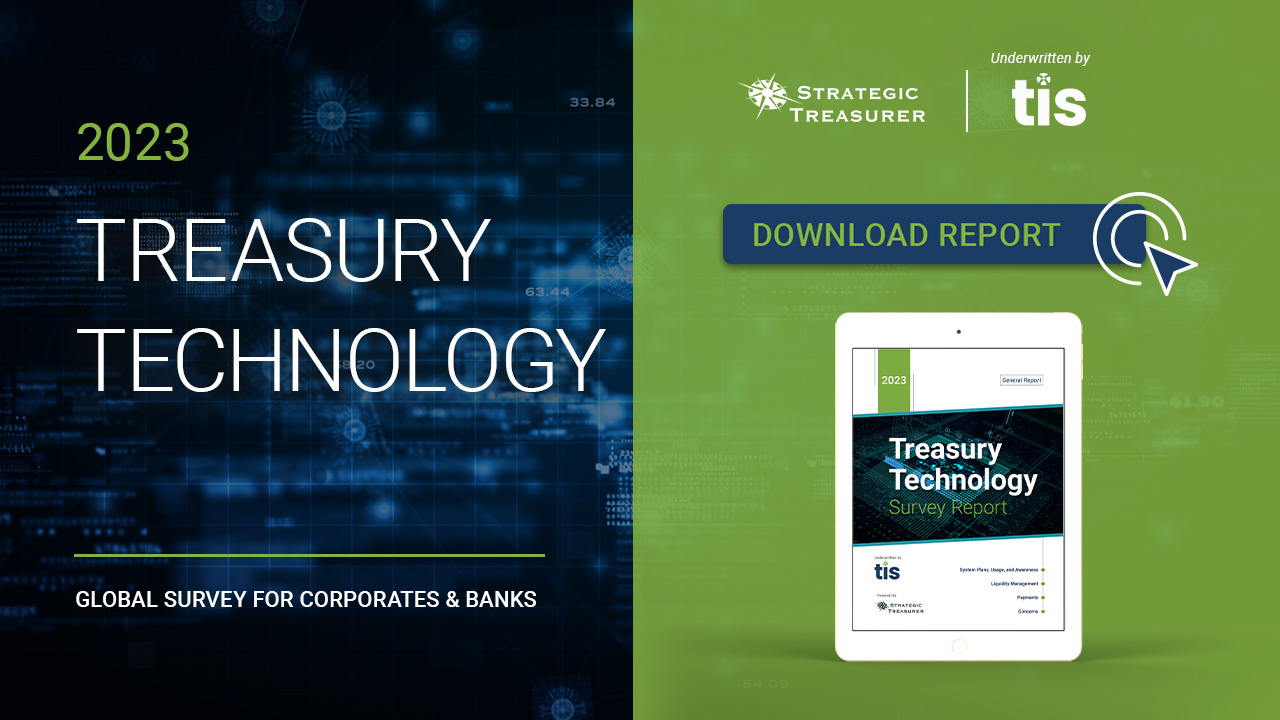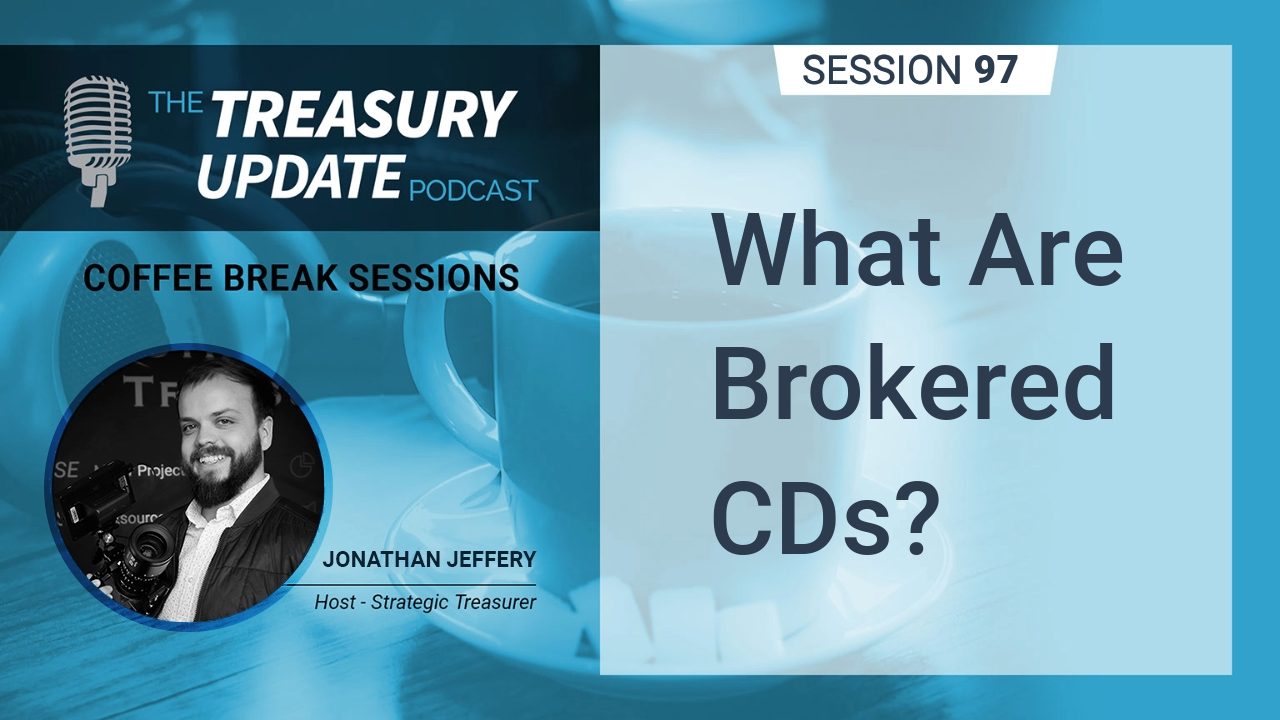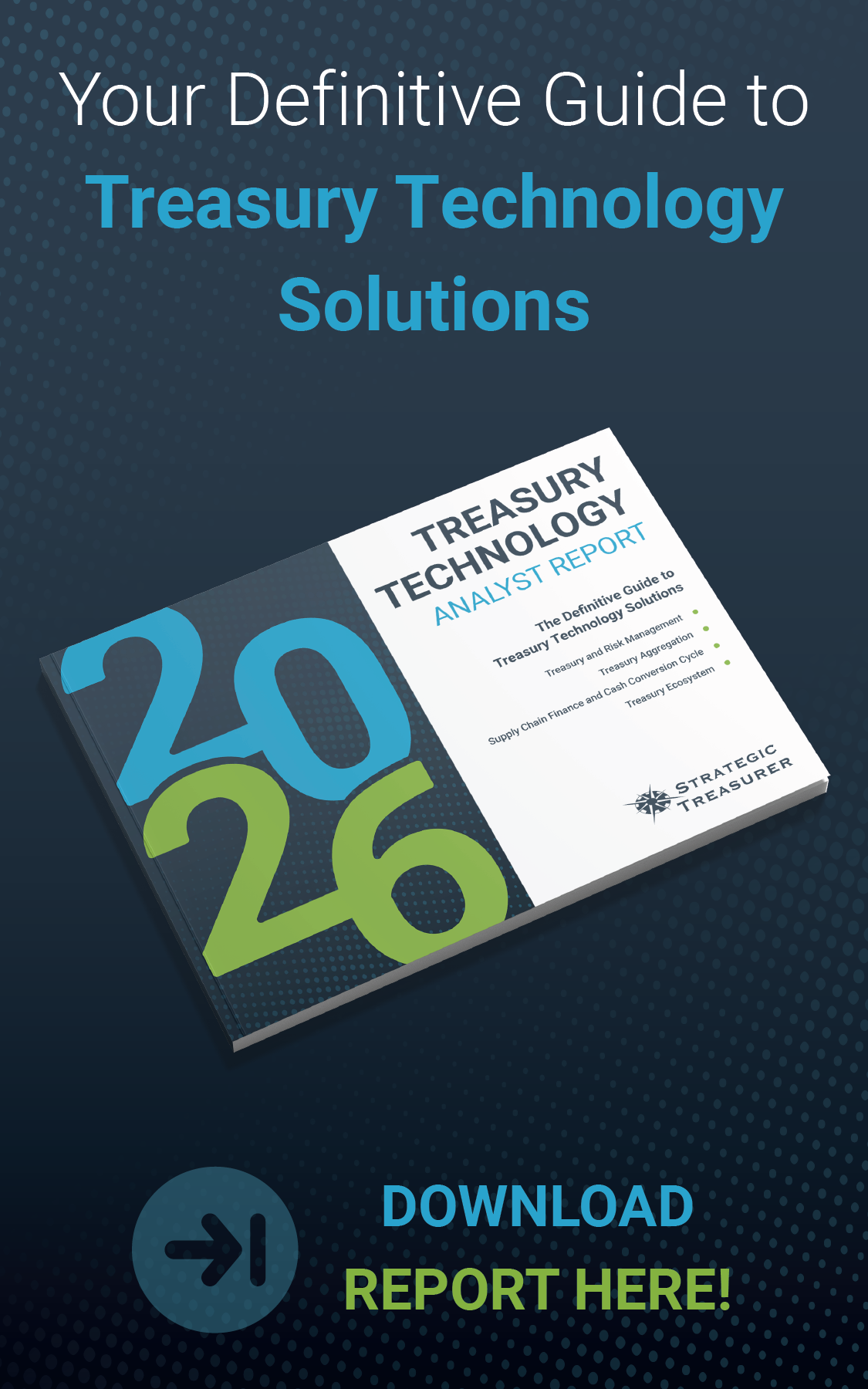
Session 98
What Are Callable CDs?
In today’s episode of the Treasury Update Podcast, we demystify callable CDs. Discover what sets them apart from regular CDs, the reasons banks issue them, whether brokered CDs can be callable, and what happens when a CD is called. Listen in for more information!
Host:
Jonathan Jeffery, Strategic Treasurer


Speaker:
Paul Galloway, Strategic Treasurer


Episode Transcription - (Coffee Break Session Series) - Episode 98 - What are Callable CDs?
Jonathan Jeffery 00:02
Welcome to the Treasury Update Podcast Coffee Break sessions presented by Strategic Treasurer, the show where we cover foundational topics and core treasury issues in about the same amount of time it takes you to drink your cup of coffee. I’ll be your host, Jonathan, media production specialist here at Strategic Treasurer. So sit back, relax and enjoy the show. So I’m here with Paul Galloway on our second episode about CDs. Today we’re going to be talking about callable CDs. Welcome back to the show, Paul.
Paul Galloway 00:32
Thanks for having me again, Jon.
Jonathan Jeffery 00:34
Yeah, it’s good to have you here. This is our fourth episode about CDs actually, too, with you, too, with Craig. So if you guys have missed here in the other podcast, go back and listen to him. There’s some cool information on CDs. So Paul, what is a callable CD? And how is it different than a broken CD or regular CD.
Paul Galloway 00:52
We talked about what brokered CDs are, traditional CDs as well, we kind of gave an example, traditionally, and what people think about is a go make this investment and CD, and some months down the road, I get my principal back and interest. Now, there are reasons why banks might want to build into the structure of the CD, the ability to call that back. And so what a callable CD is is the bank has the right they have an option. So they bought a right to call that CD back. And so in the terms of the agreement with you, they may incent you a little bit additional interest, they have the right to do that. So that’s, that’s that call feature. So they’re paying something to get a call feature into the CD itself. And so we’ll just use this as a transaction between you and me, as the example. You come in to me, you ask about CDs that we have available, I present to you traditional CDs, I also present to you a callable CD, add, perhaps, let’s say $100,000, you invest in me out of my CDs for 18 months, you can get an interest rate of let’s say, I’ll just say 5%, or traditional CD, that’s probably that where the rates are, but just trying to make it simple. But let’s say callable CD, I’m gonna pay you five and a quarter percent, and we’re gonna give you a little extra while you’re gone, Well, geez, same terms, while might as wellget a little extra interest, so it’s good for you. But it’s also good for the bank, the bank may have a rationale as to why they want to have a call option. And it has to do with, you know, their business strategy, what’s going on with the business, their reserves, their loan portfolio, there’s a bunch of different things or factors that go into that for the bank to make the decision to make the call, the downside for you is, is that you might not get all the interest you anticipate to get over that 18 month period. And so then what happens is, give you back, I call the CD back, let’s say after nine months, I call it back. So you’ve got half term, instead of 18 months, you only got half that term, nine months, well, I’ll give you back your principal, I’ll give you back interest for just that nine month period, you don’t get the full 18 months, so you lose out on the additional interest that you could have earned if it had gone all the way to maturity. The other thing is, is that you as an investor, you have what’s called reinvestment risk. So now you’ve got to go back out into the market and reinvest your $100,000 that you have. So you’re sitting there going okay, now I gotta figure out you know, term, a figure out acceptable rates, I want to get a callable CD again, maybe I like that. Then I’m okay with that. And I’m gonna get better terms, or I didn’t like that. So I’m not gonna get one with a callable feature. So kind of maybe more than what you wanted or bargained for in terms of a response. But that’s what a callable CD is.
Jonathan Jeffery 04:04
Yeah, there’s risks that you have to stay on top of it, more so than if it went through fruition. Now I can see a bank doing this. If they think rates are about to drop. They might have a bunch of callable CDs, because they say, Okay, we’re given 5%. But we think rates are going to be down to like three in a year.
Paul Galloway 04:21
Yeah.
Jonathan Jeffery 04:21
So is there another situation where that might happen? Or is that kind of main situation?
Paul Galloway 04:26
That’s definitely a key factor or key situation where banks are anticipating rates are going to drop. There’s been a lot of interest rate hikes recently. And there have been chatter out in the market. This is the market anticipating, hey, the Feds gonna have to start cutting rates here at some point. We’re probably at a point where the Fed is not going to raise rates necessarily, may be a couple more means before they raise rates again, or they may be just willing to see how the market reacts and wherethings kind of play out. But there is a thought that we’re going to have higher rates for a longer period. But at some point, the economy is going to get to it’s going to work its way through its normal cycle process. And we talked about potential for recession, maybe we do enter into a mild recession of some kind, we start coming back out of that recession. And what happens is, with interest rates, the Fed will want to help jumpstart process for recovery in the economy. And a way to do that is to cut interest rates. And ifa bank anticipates rate cuts are going to happen, to your sample earlier, well, rates are gonna go down, the bank’s gonna want to have that call feature so that they can lower the interest that they pay out to you. They don’t want five and a quarter anymore, they want 3%. That’s better for them. They’re going to get less yield on the investments they make for their loans because as rates drop, loan rates will drop as well.
Jonathan Jeffery 06:03
So do they know something we don’t or as it just, it might not be an indicator that rates are going to drop, but it’s an indicator that people think rates are going to drop, is that right?
Paul Galloway 06:12
It can be. It can be an indicator that they anticipate that rates will drop at some point, they just don’t know when it’s so they write the call feature into the CD. So they have that optionality to to do that if rates do move. And so you probably have seen an uptick in callable CDs recently, because people are starting to anticipate, especially if they get CDs, or grown out long periods, let’s say, two, three years or something like that, and duration, then having a call feature in there, it’s probably worth it to the bank to have that, yeah, they’re gonna have to pay a little extra interest today. But down the road, when they see a drop in rates, and they’re able to refinance, that loan that they’re getting from you, as a depositor, that’s good for them.
Jonathan Jeffery 07:02
Is there any other circumstance where the bank is going to call these CDs?
Paul Galloway 07:07
It could be that it has to do with just the bank business itself and the reserve requirements that, you know, they don’t have to hold as much unnecessarily in reserve. And that gives them the opportunity to bring down their interest costs. So they can drop the interest expense by paying off some of these CDs that they’re paying maybe perhaps higher rates out on, and they can go and get cheaper funds to make more loans. So that could be a rationale as to why a bank might do that.
Jonathan Jeffery 07:40
Okay. And what’s the process like when they when they call them?
Paul Galloway 07:43
That’s great. So it’ll be written into the agreement with the CD as to what kind of notification they gotta provide. Usually, it’s some kind of written notification in today’s world, it can come electronically to you as an investor. Hey, Jon, we’re calling the CD. They’ll give you the parameters in terms of when it’s going to be the call date, theyexercise that, they pay you out your principal plus interest, per the terms of the contract.
Jonathan Jeffery 08:15
Does the buyer have any say in that? Like, can the buyer go to the bank and say, I want you to call this CD?
Paul Galloway 08:20
No, unfortunately, the buyer does, and so they don’t have a put option. So that would be the flip side, as you describe that. So you haven’t bought an option at all. There’s no optionality on your side as a buyer. So you can’t put or force the bank to call that bond. The bank owns the call feature.
Jonathan Jeffery 08:43
Okay. Anything else you want to add about callable CDs? Cool. Well, thank you for sharing your thoughts today.
Paul Galloway 08:46
So one of the things to think about when it comes to call features on any any type of investment, the longer that you go out on the duration side, so let’s say, you know, you’re buying a bond that’s longer term, you know, 5, 10, 15 years, CDs, you know, 18 months, three years, five years, CDs, that’s a similar kind of effect. The longer you go out in duration, the more risk there is associated with the investment that you’re making, when you’re buying the CDs. What that means is that, you know, we kind of talked about what brokered CDs are talking about the interest that you earn on it, you’re not going to get as much interest back. So there is what I call variants that the longeryou go out, the wider that gets. So your risk associated with return on that, with a callable feature, it gets riskier out there. Thanks, Jon. Appreciate you having me back again. So always enjoy the conversation.
Jonathan Jeffery 09:43
Yeah. And to our listeners, make sure you tune back every first and third Thursday. We’ll have another Coffee Break Session for you. Thanks.
Announcer 10:05
This podcast is provided for informational purposes only, and statements made by Strategic Treasurer LLC on this podcast are not intended as legal, business, consulting, or tax advice. For more information, visit and bookmark StrategicTreasurer.com.
In today’s episode, Paul Galloway, Senior Director, Advisory Services at Strategic Treasurer, shares a concise exploration of brokered CDs. You’ll learn what they are, how they differ from traditional CDs, the associated risks, what happens at maturity, tax considerations, and the option to sell them. Listen in for more information!




